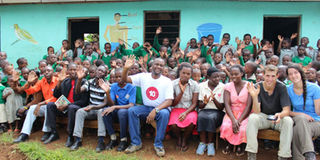Bekunda’s battle with alcoholism

Bill Kahirimbanyi Bekunda (in white T-shirt) with school and staff of Loving Hearts
Helping Hands Primary School in Kabale District. Photos by Edgar R. Batte
What you need to know:
Turning point. Bill Kahirimbanyi Bekunda, an alcoholic, turned his life around after near death experiences while under the influence. Today, he is a campaigner against underage drinking.
Bill Kahirimbanyi Bekunda realised he had a drinking problem during his Senior Six (S6) vacation. He could neither control how much he drank nor his actions when intoxicated. Friends started questioning his drinking habits, some with the suspicion that he pretended to be very drank, so he could get away with being a nuisance.
Bekunda started drinking while in Senior Two. He was drawn into the addiction after seeing “cool” guys at his school then, St Mary’s College Kisubi (Smack), drinking kasese (local gin) from the village outside the school. “Many of them started in Senior One and I remember confronting a couple of them about it. I felt it wasn’t right to spend their parents’ hard-earned money on alcohol, especially at school,” he recounts.
Mama Teo’s was the drinking place the youngsters frequented. One day, towards the beginning of the term, Bekunda was convinced by a friend to also give it a try. It was the most memorable experience because after the first few sips, he felt like a new person. “I felt confident and could freely get loud and rowdy because the alcohol gave me the feeling that I was in control of my life,” he says.
From that day henceforth, he indulged whenever he could afford to buy some alcohol or had friends foot his bill for a few rounds. He never missed a drink night. But with the alcoholism, came some very bad incidents some of which he says he is rather embarrassed to relay on pages of a family paper.
He shares one though. On their way back to school from a drink-up, they lay flat in the middle of Entebbe Road with ‘drank-mates’ late at night in a competition to see who would get up last as a car drove towards them. He has also been beaten up while drunk, and been left with no shoes and no coat in conditions where temperatures were very chilly.
At some point, he checked into a rehabilitation facility, for three months. “I cornered myself into it. I was distractive with every binge and all my friends walked out every time I tried to join them anywhere. Some actually beat me up on a number of occasions. I also had debts in every alcohol retailer surrounding my place of residence, Bukoto White Flats at the time,” he recollects.
One drunken morning, Bekunda overturned his workmate’s car on Lugogo Bypass junction. He was whisked away by IAA who happened to be passing by, before the cops could get to the scene. Shortly after surviving that incident, he rummed a car into his favourite uncle’s gate where he used to take refuge. With nowhere to run and noone to run to, Bekunda asked his mother to help him get into rehab, which she had attempted to do for so long and he had resisted.
After the rehab, he chose never to drink again and make up for lost time but he relapsed a few weeks later. Fortunately, that reinforced a reality of what he was taught during his three months of rehabilitation. This, together with support from a colleague with whom he did time in rehab, enabled him go for many more years sober.
Two years ago, Bekunda started a Stop Underage Drinking Uganda (SUDU) campaign after his research led him to a realisation that his alcohol problem was a result of early alcohol abuse. He started reaching out to people on social media and slowly but surely the few interested ones started to contact him for help. He helps with interventions to get alcoholics rehabilitated. He explains: “I hold motivational talks on hope and recovery using my life story. My life story also stands out as evidence to the reality of underage drinking, addiction and recovery and I speak both in private arrangements and to public gatherings and congregations of both young people and adults, sufferers and the ignorant, to break the stigma and silence on alcohol problems.”
Sudu also has a team of recovering addicts and behavioural health professionals that sensitise the public on behavioural health matters. The project also has school prevention programmes, family programmes, community prevention programmes and ghetto outreach. They also help parents identify signs of children inclined to alcohol use. Bekunda says they are soon starting parents’ conferences and townhall meetings.
His project
Stop Underage Drinking Uganda has a team of recovering addicts and behavioural health professionals that sensitise the public on behavioural health matters. The project also has school prevention programmes, family prevention programmes, community prevention programmes and ghetto outreach. They also help parents identify signs of children inclined to problem alcohol use. Bekunda says they are soon starting parents’ conferences and town hall meetings.
Bekunda’s tips on fighting alcoholism
1. Learn to have fun without alcohol
2. Learn how to process your emotions without alcohol
3. Find true meaning in your life that makes you being sober worthwhile
4. Learn how to communicate openly and honestly
5. Learn how to avoid relapse in a society that loves to drink
6. Learn how to build positive, uplifting relationships
7. Learn to cut out toxic relationships from your life.
8. Talk to your kids early and talk often about alcohol and its consequences.




